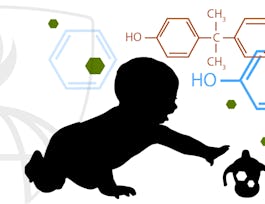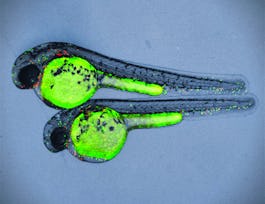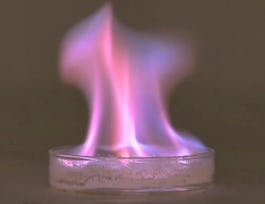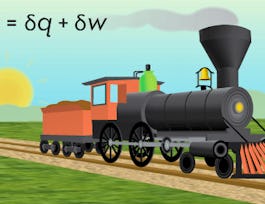Chemistry
Earn Your Degree
Most Popular Courses
Finish a Chemistry Course in Under 24 Hours
Top Rated Courses
Most Popular Certificates
Frequently Asked Questions about Chemistry
Chemistry is one of the most important physical sciences. All types of solid, liquid, and gaseous matter are made up of different types of atoms and molecules, and chemistry studies the structure of these substances and how they determine their unique properties. It also studies how different substances combine or separate under different conditions to form new substances, much in the same way that we use “chemistry” to describe how two people get along (or don’t) in our interpersonal lives.
Because chemistry starts with the basic building blocks of matter - recall the periodic table of elements from your high school chemistry class - the foundational skills of this discipline are the same regardless of what you want to accomplish with them. However, beyond those analytic foundations, the field of chemistry includes an array of subfields almost as varied as the elements themselves.
Physical chemistry, for example, combines chemistry and physics to study how different types of matter and energy interact. Environmental chemistry combines chemistry and environmental science to examine how chemicals react with the natural environment. Similarly, geochemistry combines chemistry and geology to study the composition of substances found within the Earth, as well as how they interact with each other.
Other types of chemistry touch our lives even more directly. Biochemistry studies the chemical processes that occur within living organisms, including the human body. Food chemistry examines how the different types of food and their biological components - carbohydrates, lipids, and proteins - impact the nutrition, taste, and safety of our food. And agricultural chemistry looks at the substances involved in the production and protection of crops, ensuring that pesticides, herbicides, and fertilizers are safe for humans as well as the environment.
The list goes on and on. Our world, and our bodies, are made up of matter - and chemistry provides the critically important analytic framework to understanding how all these types of matter “get along.”
Because chemistry is a foundational science with relevance to such a wide range of industries, a background in chemistry can lead to an incredibly diverse range of careers. With a background in this discipline, your job opportunities really depend on what kind of work you’re interested in doing - and in what type of field.
If you want to apply your expertise in chemistry to real-world problems, you can work in the private sector as a chemical engineer. Chemical engineers are responsible for the development, testing, production, and use of substances used in food, drugs, fuels, and countless other products, ensuring that these chemicals and the processes used to manufacture them are safe, reliable, and effective. There are also many specializations within this field that focus on certain types of manufacturing processes, like polymerization or oxidation, or certain classes of products, such as nanomaterials or bioproducts.
No matter what your focus, chemical engineers are in demand at companies of every size, from multinational corporations like Dow Chemical and Dupont to up-and-coming startups developing novel approaches and products.
Chemistry expertise is also needed in government agencies, particularly in those responsible for protecting public health. In the United States, for example, the Environmental Protection Agency employs chemists to develop standards and testing procedures for safe air and water, and the Food and Drug Administration is responsible for doing the same for all of the substances we ingest. Chemistry experts are also needed in law enforcement in roles like forensic chemists, who help solve crimes through the analysis of chemical evidence.
Finally, if your interest is purely in the field of chemistry itself, you can find work in research and academia. If you want to advance the frontiers of this discipline, you can work in university or government laboratories to discover new substances and processes for producing them. Or, if you want to pass on your passion for chemistry to the next generation of students, you can become a high school chemistry teacher.
Coursera offers courses in chemistry that can fit your needs regardless of your existing background in this subject. If you’re just getting started, you can take introductory level courses in chemistry and its major subfields, including organic chemistry and physical chemistry. On the other hand, if you already have a background in chemistry and want to delve deeper into specific areas of the field, you can take more specialized courses in chemical engineering, biochemistry, pharmaceutical chemistry, and even nanotechnology.
Regardless of your area of interest, learning online through Coursera means getting a high-quality education from top-ranked institutions like Duke University, the University of Minnesota, and Johns Hopkins University. You’ll learn from the same faculty and course materials as on-campus students, but at a significantly lower cost and on a flexible schedule that fits your existing job or family life.
Any background in science, whether it's work related, an internship, or taking classes at the high school or college level can help prepare you to study chemistry. A background in math can also be helpful. Starting with subjects like algebra, physics, geometry, engineering, biology, and calculus are usually the best preparation for studying chemistry.
People who work in roles involving chemistry are typically critical thinkers and problem solvers with a mind for science. You should be inquisitive with a desire to learn more about certain topics, and you can't be afraid to get dirty with hands-on experiments and research. You'll also need to be analytical and creative. Ingenuity is important, as is your ability to think quickly, especially when performing math equations or troubleshooting. You must be organized and able to pay close attention to even the smallest of details. Finally, you'll need good interpersonal skills. People who work in roles involving chemistry may work on projects individually at times, but you may also find yourself working with a team and other colleagues too.
Becoming a chemist is one option if you study chemistry, but you have many more career paths to explore. Chemical engineering is a popular one, as is forensic science. If you're interested in health care, you might become a pharmacologist, toxicologist, pharmacist, or epidemiologist. Many people who study chemistry choose to work in jobs that involve lifelong research, while others choose to become educators at the high school or postsecondary levels. Whatever you choose, keep in mind that many chemistry careers require you to earn graduate degrees, especially if you want to advance beyond entry-level jobs.
Many people who study chemistry go on to work at high school, colleges, universities, technical schools, and research institutions, but there are many options beyond academia. For example, you can work for a government agency or help solve crimes with a job in a forensics lab. If you prefer the private sector, you may find job opportunities with pharmaceutical companies, chemical manufacturers, instrument manufacturers, and companies that make products like paint, petroleum, or plastics.
When looking to enhance your workforce's skills in Chemistry, it's crucial to select a course that aligns with their current abilities and learning objectives. Our Skills Dashboard is an invaluable tool for identifying skill gaps and choosing the most appropriate course for effective upskilling. For a comprehensive understanding of how our courses can benefit your employees, explore the enterprise solutions we offer. Discover more about our tailored programs at Coursera for Business here.


























































